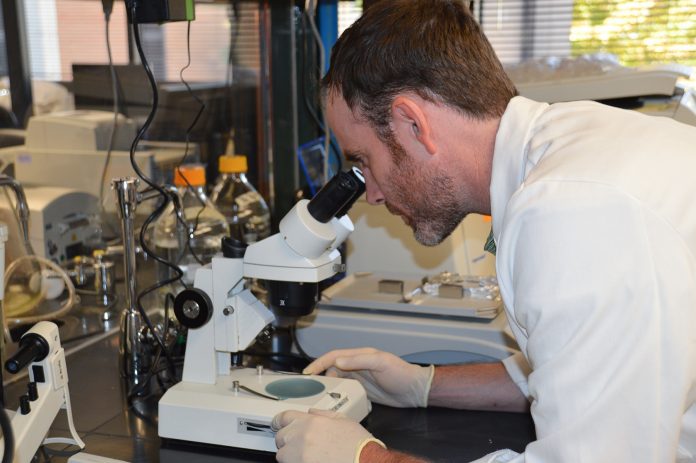In new research from the Oklahoma Medical Research Foundation, scientists have discovered subtle biological signs in the development of multiple sclerosis that point to the need for highly individualized treatment plans for patients suffering from the disease.
MS damages the nervous system’s ability to carry signals to and from the brain. The disease can cause a wide variety of symptoms, including problems with vision, tremors, paralysis, muscle spasms, imbalance and cognitive changes.
Working with a team of international researchers, OMRF scientist Robert Axtell, Ph.D., completed a study to identify patient responses to different MS therapies, including the popular treatment interferon-beta. The findings were published in the journal Neurology, Neuroimmunology & Neuroinflammation.
According to Axtell, the wide range of patient responses to medications is one of the biggest hurdles in treating MS, as the disease can be caused or affected by a variety of factors. Researchers measured 50 immune molecules in the blood and found that certain subsets of MS patients responded well to standard treatments while others did not.
“We looked for biomarkers that indicated the presence of disease, because they can help us identify which patients respond to specific therapies,’” said Axtell. “We collaborated with a lot of folks and received blood samples and clinical data from a sizable MS patient population. It took a lot of effort from many clinical and basic scientists to complete this study.”
By knowing which biomarkers are associated with specific reactions or responses to certain drugs, said Axtell, scientists will have a better idea of how individual patients will respond to specific types of therapy. “Our study definitely showed us that MS is not biologically the same in every patient, and that lets us know that a personalized approach is needed when it comes to treatment.”
Harald Hegen, M.D., Ph.D., of the Medical University of Innsbruck, Austria, who collaborated with Axtell on the study, believes that the research provides helpful information to guide patient treatment.
“Given the large and increasing number of disease-modifying treatments for MS, there is a strong clinical need for biomarkers that enable treatment allocation in the individual patient,” said Hegen. “In the present study we observed that MS patients can be grouped by specific patterns of immune molecules, which were predictive for response to interferon-beta therapy.”
Axtell said these results may eventually help scientists use these immune molecules as a predictive test for MS.
“We need to do many other studies to verify the molecules and refine the testing before this can be taken forward commercially,” said Axtell. “But this research lays the groundwork for developing tests for prediction of MS or patient treatment options for the disease.”
OMRF scientists Christopher Lessard, Ph.D., and Indra Adrianto, Ph.D., also contributed to the work, which was supported by grants R00NS075099 from the National Institute of Neurological Disorders and Stroke and P30GM110766 from the National Institute of General Medical Science, both a part of the National Institutes of Health.













